 Database
Database
 Mysql Tutorial
Mysql Tutorial
 Detailed explanation of database MySQL Chinese garbled solution summary (pictures and texts)
Detailed explanation of database MySQL Chinese garbled solution summary (pictures and texts)
Detailed explanation of database MySQL Chinese garbled solution summary (pictures and texts)
This article mainly introduces the relevant information of the databaseMySQLThe solution to Chinese garbled characters is summarized. The database saves Chinese characters, so we often encounter database garbled characters. Here are several methods. Friends who need it can Refer to the following
MySQL Chinese garbled solution
Foreword:
MySQL is a very commonly used data database in our projects . But because we need to save Chinese characters in the database, we often encounter database garbled characters. Let’s introduce how to completely solve the problem of Chinese garbled characters in the database.
1, Chinese garbled code
1.1, Chinese garbled code
create table user(name varchar(11)); # 创建user表
insert into table user("carl"); # 添加数据
select * from user;
insert into user value("哈哈");Unable to insert Chinese characters:

1.2. Check table character encoding
mysql> show create table user \G;
*************************** 1. row ***************************
Table: user
Create Table: CREATE TABLE `user` (
`name` varchar(11) DEFAULT NULL
) ENGINE=InnoDB DEFAULT CHARSET=latin1
1 row in set (0.00 sec)We can see that the default character set of the table is latin1.
So we need to specify the table when we create it The character set:
create table user(name varchar(11)) default charset=utf8;
can be accessed in Linux and the table can be inserted and accessed.
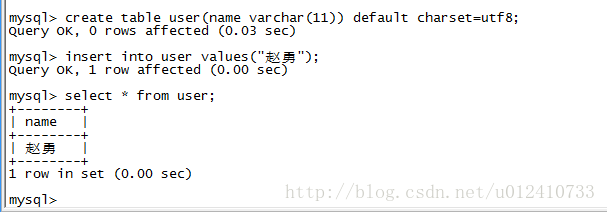
1.3. Database and operating system encoding
Although Chinese can be displayed normally on the server side, garbled characters may be displayed on the client side. Because our server is UTF8.
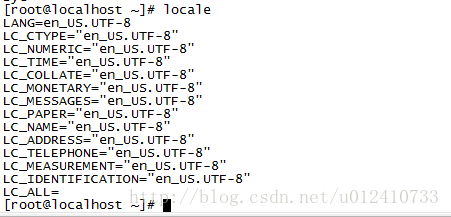
And there are also problems with the encoding of the database.
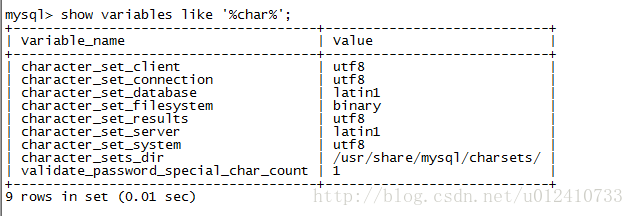
Here we can see that the character sets of character_sert_database and character_set_server are both latin1. Then in mysql database, the character sets of server, database and table are all The default is latin1. Let's take a look at how to solve the mysql garbled situation.
2. Mysql settingsThe scope of variables
2.1.sessionScope
View database encoding :
show variables like '%char%';
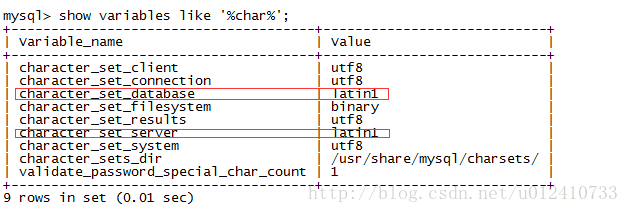
Modify character encoding:
set character_set_server=utf8; set character_set_database=utf8; show variables like '%char%';
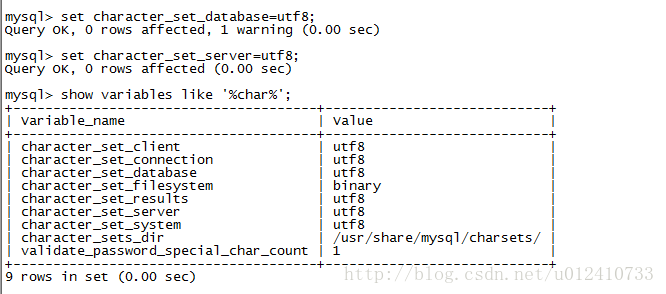
We can see that the character set has been modified to utf8. But there is a problem here, that is, if we reopen a command window and check the data encoding, the following screen will appear:
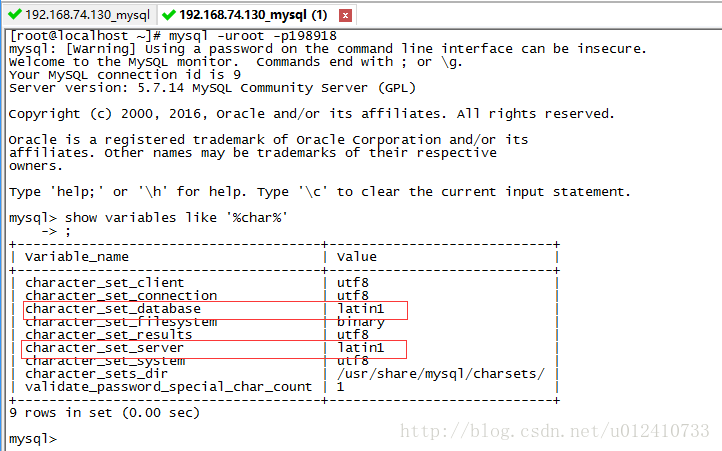
2.2, global range
The scope of mysql setting variables defaults to the session scope. If you set the character set of multiple sessions, you need to set the global scope: Set [global|session] variables...
set global character_set_database=utf8; set global character_set_server=utf8; show variables like '%char%';
When we view across sessionsmysql character setYou will see that they are all utf8. If you think everything is fine, you are totally wrong.
2.3. Set the global scope of data
When our database restarts, you find that the value of setting the global scope becomes latin1 again.
service mysqld restart mysql -uroot -pyourpassword show variables like '%char%';
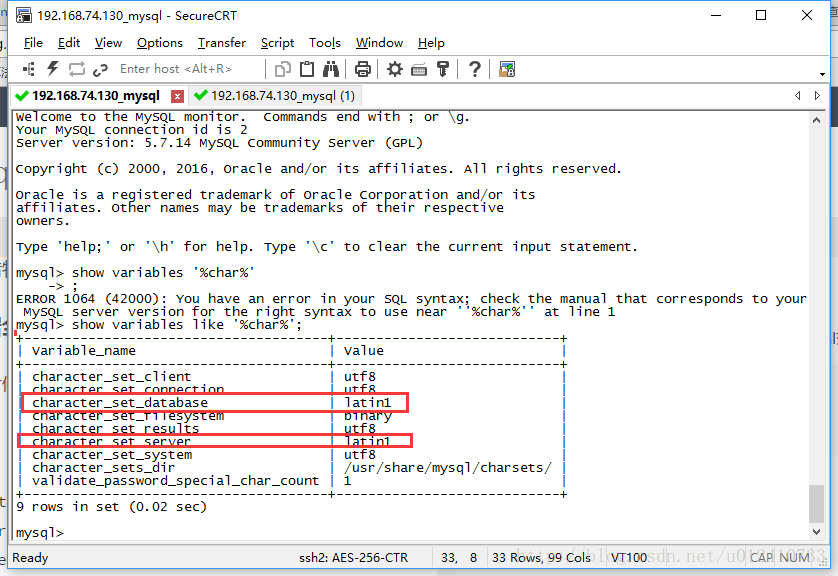
Don’t be afraid, the following will teach you the ultimate trick:
Modify mysqlConfiguration file/etc/my.cnf.
[mysqld] character-set-server=utf8 [client] default-character-set=utf8 [mysql] default-character-set=utf8
Please pay attention to the location of these parameter configurations, otherwise the mysql service may not be started:
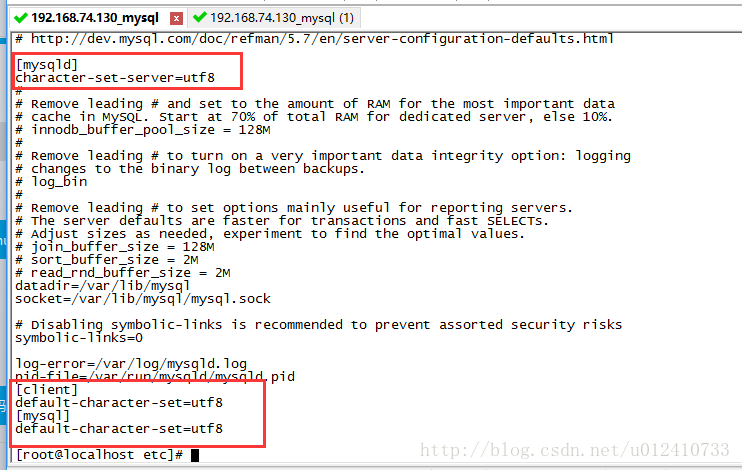
OK. Now if you restart the mysql service, you will also find that its character set is utf8.

And we do not need to specify the character encoding when creating the table, it defaults to utf8;
drop database test; create database test; use test; create table user(name varchar(11)); show create table user \G;
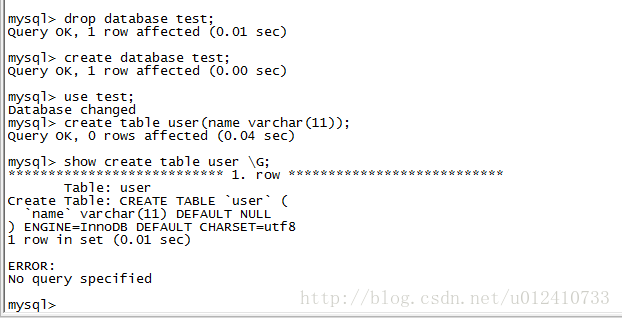
3. Summary
I see that many answers on the Internet are directly at the session level. Setting the character encoding of MySQL is a temporary solution rather than a permanent solution. We still need to solve this problem from the source. That is to modify the default configuration file of mysql and change its character set to UTF8 that can use Chinese characters.
The above is the detailed content of Detailed explanation of database MySQL Chinese garbled solution summary (pictures and texts). For more information, please follow other related articles on the PHP Chinese website!

Hot AI Tools

Undresser.AI Undress
AI-powered app for creating realistic nude photos

AI Clothes Remover
Online AI tool for removing clothes from photos.

Undress AI Tool
Undress images for free

Clothoff.io
AI clothes remover

AI Hentai Generator
Generate AI Hentai for free.

Hot Article

Hot Tools

Notepad++7.3.1
Easy-to-use and free code editor

SublimeText3 Chinese version
Chinese version, very easy to use

Zend Studio 13.0.1
Powerful PHP integrated development environment

Dreamweaver CS6
Visual web development tools

SublimeText3 Mac version
God-level code editing software (SublimeText3)

Hot Topics
 1386
1386
 52
52
 MySQL: Simple Concepts for Easy Learning
Apr 10, 2025 am 09:29 AM
MySQL: Simple Concepts for Easy Learning
Apr 10, 2025 am 09:29 AM
MySQL is an open source relational database management system. 1) Create database and tables: Use the CREATEDATABASE and CREATETABLE commands. 2) Basic operations: INSERT, UPDATE, DELETE and SELECT. 3) Advanced operations: JOIN, subquery and transaction processing. 4) Debugging skills: Check syntax, data type and permissions. 5) Optimization suggestions: Use indexes, avoid SELECT* and use transactions.
 How to open phpmyadmin
Apr 10, 2025 pm 10:51 PM
How to open phpmyadmin
Apr 10, 2025 pm 10:51 PM
You can open phpMyAdmin through the following steps: 1. Log in to the website control panel; 2. Find and click the phpMyAdmin icon; 3. Enter MySQL credentials; 4. Click "Login".
 MySQL: An Introduction to the World's Most Popular Database
Apr 12, 2025 am 12:18 AM
MySQL: An Introduction to the World's Most Popular Database
Apr 12, 2025 am 12:18 AM
MySQL is an open source relational database management system, mainly used to store and retrieve data quickly and reliably. Its working principle includes client requests, query resolution, execution of queries and return results. Examples of usage include creating tables, inserting and querying data, and advanced features such as JOIN operations. Common errors involve SQL syntax, data types, and permissions, and optimization suggestions include the use of indexes, optimized queries, and partitioning of tables.
 Why Use MySQL? Benefits and Advantages
Apr 12, 2025 am 12:17 AM
Why Use MySQL? Benefits and Advantages
Apr 12, 2025 am 12:17 AM
MySQL is chosen for its performance, reliability, ease of use, and community support. 1.MySQL provides efficient data storage and retrieval functions, supporting multiple data types and advanced query operations. 2. Adopt client-server architecture and multiple storage engines to support transaction and query optimization. 3. Easy to use, supports a variety of operating systems and programming languages. 4. Have strong community support and provide rich resources and solutions.
 How to use single threaded redis
Apr 10, 2025 pm 07:12 PM
How to use single threaded redis
Apr 10, 2025 pm 07:12 PM
Redis uses a single threaded architecture to provide high performance, simplicity, and consistency. It utilizes I/O multiplexing, event loops, non-blocking I/O, and shared memory to improve concurrency, but with limitations of concurrency limitations, single point of failure, and unsuitable for write-intensive workloads.
 MySQL and SQL: Essential Skills for Developers
Apr 10, 2025 am 09:30 AM
MySQL and SQL: Essential Skills for Developers
Apr 10, 2025 am 09:30 AM
MySQL and SQL are essential skills for developers. 1.MySQL is an open source relational database management system, and SQL is the standard language used to manage and operate databases. 2.MySQL supports multiple storage engines through efficient data storage and retrieval functions, and SQL completes complex data operations through simple statements. 3. Examples of usage include basic queries and advanced queries, such as filtering and sorting by condition. 4. Common errors include syntax errors and performance issues, which can be optimized by checking SQL statements and using EXPLAIN commands. 5. Performance optimization techniques include using indexes, avoiding full table scanning, optimizing JOIN operations and improving code readability.
 MySQL's Place: Databases and Programming
Apr 13, 2025 am 12:18 AM
MySQL's Place: Databases and Programming
Apr 13, 2025 am 12:18 AM
MySQL's position in databases and programming is very important. It is an open source relational database management system that is widely used in various application scenarios. 1) MySQL provides efficient data storage, organization and retrieval functions, supporting Web, mobile and enterprise-level systems. 2) It uses a client-server architecture, supports multiple storage engines and index optimization. 3) Basic usages include creating tables and inserting data, and advanced usages involve multi-table JOINs and complex queries. 4) Frequently asked questions such as SQL syntax errors and performance issues can be debugged through the EXPLAIN command and slow query log. 5) Performance optimization methods include rational use of indexes, optimized query and use of caches. Best practices include using transactions and PreparedStatemen
 Monitor Redis Droplet with Redis Exporter Service
Apr 10, 2025 pm 01:36 PM
Monitor Redis Droplet with Redis Exporter Service
Apr 10, 2025 pm 01:36 PM
Effective monitoring of Redis databases is critical to maintaining optimal performance, identifying potential bottlenecks, and ensuring overall system reliability. Redis Exporter Service is a powerful utility designed to monitor Redis databases using Prometheus. This tutorial will guide you through the complete setup and configuration of Redis Exporter Service, ensuring you seamlessly build monitoring solutions. By studying this tutorial, you will achieve fully operational monitoring settings



